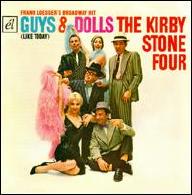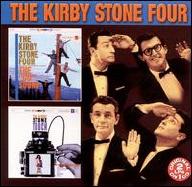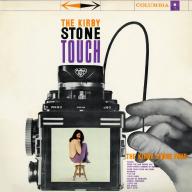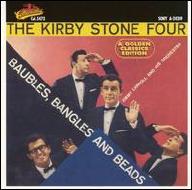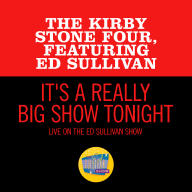Kirby Stone (b. April 27, 1918, New York, NY; d. July 13, 1981) was the group's founder/leader, and strangely enough, the quartet -- filled out by Eddie Hall, Mike Gardner, and Larry Foster -- started out in the mid-'50s as an instrumental ensemble. Vocals were only incidental to their sound in the early days, when they played mostly in small clubs, although the singing eventually took center stage in their work and, coupled with their exuberant, irreverent humor and a sense of showmanship, made their appeal more obvious. They started getting showcased in better nightspots and on local television in New York before being signed to appear on #The Ed Sullivan Show, which led to a contract from Columbia Records. Their debut album, Man, I Flipped When I Heard the Kirby Stone Four, featured a mix of covers of pop standards by George Gershwin and others, interspersed with originals by Stone and Gardner, the quartet's primary in-house songwriters. Later in 1958, they enjoyed a number 25 single with their recording of Baubles, Bangles and Beads (from +Kismet) -- which got them a Grammy nomination -- and a number 15 chart placement for the accompanying LP. Its success and their versatility led to the release of two complete LPs by the quartet in 1959, in those days an extraordinary achievement in itself.
The group's rendition of Baubles, Bangles and Beads was highly animated in its upbeat sensibilities, taking the song far from its more subtle origins -- their music was funny, almost (but not quite) in a Spike Jones sort of way, and featured some very solid instrumental backing. They tended to perk up the tempo of anything they were doing, making some of the more exciting vocal pop group material of their time, and also tried to take advantage of the move into stereo releases that started the same year as their recording contract. At various times, their backing included Jimmy Carroll His Orchestra, the Kai Winding Quartette, and such luminaries as Alvino Rey, Shelly Manne, and Al Klink, among others. By the end of the 1950s, they'd reached a new plateau of sophistication with what became known as the "Go" sound, a mix of swing, jazz vocalizing, and "big beat" (as rock & roll was called by those who didn't want to use the phrase), an uptempo sound that gave the group its most distinctive trademark and carried it into the following decade. They were also occasionally risqué in their arrangements, such as getting the girl chorus in Let's Do It to coo "do it" very softly -- they weren't your usual '50s vocal quartet and, despite appearances to the contrary, hardly the model for comedy's later "Four Neat Guys." The group was a fixture of network variety television during the first half of the decade, including appearances on #The Judy Garland Show. Their relentlessly upbeat, outgoing, exuberant sound retained a major audience among adult listeners right into the mid-'60s, by which time their brand of vocal pop was on the wane.
Still, they soldiered on -- there was always work for them, if not room on the charts or radio playlists of most radio stations for their brand of music, and they did try to adapt. In 1966, the Kirby Stone Four teamed up with the Tokens (the vocal group best known for its rendition of The Lion Sleeps Tonight) to form an octet officially known as the United States Double Quartet, in an effort to update their sound. The song that pulled the two groups together on the Tokens' own B.T. Puppy label was called Life Is Groovy, and was co-authored by Ralph Affoumado, then a young conductor, music teacher, and aspiring composer from New York. The record was a modest chart success, selling well enough to be heard on the New York airwaves fairly heavily, and to yield an LP of the same name, which constituted a recording swan song for the Kirby Stone Four. By the time it was released, Larry Foster had left the lineup and was replaced by Jimmy Hassell. Kirby Stone himself served as music director for various television variety series during the 1960s, which is how he was best known in that medium. In more recent years, Stone's daughter Gradie Stone has been getting some serious notice as a jazz singer. Meanwhile, the Kirby Stone Four's music, including The Go Sound and The Kirby Stone Touch LPs, has been getting reissued by Collectables Records in America and by Sony Music in Europe, and even Life Is Groovy showed up on CD (albeit as part of a Tokens compilation) in the early 21st century. They're part of a late-'50s American vocal pop heritage that is appreciated overseas and beginning to be remembered in the United States. ~ Bruce Eder, Rovi


